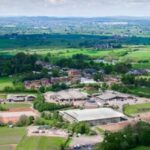
Agriculture, earth and environmental sciences courses
Agriculture, earth and environmental sciences focus on understanding the natural world and how people interact with it. These subjects help us grow food, protect ecosystems and respond to climate change.
Studying these fields abroad gives international students the chance to learn in different environments, access modern facilities, and explore global challenges from new perspectives.
Whether you want to improve farming methods, study climate systems, or help protect the planet, these subjects offer hands-on learning and meaningful careers that make a real-world impact.
A-Z of related subject guidesTop 10 Universities for agricultural sciences
| University Name | 2025 Ranking | Location |
|---|---|---|
| Wageningen University & Research | 1 | Wageningen, Netherlands |
| University of California, Davis | 2 | Davis, United States |
| Swedish University of Agricultural Sciences | 3 | Uppsala, Sweden |
| China Agricultural University | 4 | Beijing, China (Mainland) |
| Cornell University | 5 | Ithaca, United States |
| Purdue University | 6 | West Lafayette, United States |
| ETH Zurich | 7 | Zürich, Switzerland |
| Ghent University | 8 | Ghent, Belgium |
| University of California, Berkeley (UCB) | 9 | Berkeley, United States |
| Norwegian University of Life Sciences | 10 | Ås, Norway |
Why study agriculture, earth and environmental sciences abroad?
Studying abroad gives you the chance to learn from leading universities and experts in the field. You can explore unique landscapes, ecosystems, and farming systems that may not be found in your home country.
Many degrees include fieldwork, lab time and research projects. You might study soil, crops, forests, oceans or the atmosphere. Some programs offer placements or internships with farms, research centres or environmental groups.
You’ll gain useful skills such as data analysis, observation, teamwork and problem-solving. These are important in both science and practical work.
A degree from an international university can open doors to work or further study around the world. If you study in a certain country, you may also build local knowledge and contacts, helping you find job opportunities there after graduation.
Articles related to animal and veterinary sciences
Types of agriculture, earth and environmental sciences programs
There are many different study options in this area. You can choose based on your interests, whether that’s farming, conservation, or climate science.
Agriculture
Agricultural degrees look at food production, animal care and sustainable farming. You will study topics like plant science, soil health and farm technology. Some programs focus on agribusiness or global food systems.
- Agricultural Science
- Animal Science
- Agribusiness
- Crop and Soil Management
Environmental science
Environmental science combines biology, chemistry and earth science to study natural systems and how humans affect them. These degrees prepare you to work on environmental problems like pollution, habitat loss and climate change.
- Environmental Science
- Climate and Environmental Change
- Conservation and Ecology
- Environmental Policy
Earth science and geoscience
These programs study the physical processes that shape our planet, including earthquakes, volcanoes and weather systems. You’ll learn about the Earth’s structure, natural resources and environmental hazards.
- Geology
- Earth and Ocean Sciences
- Meteorology and Climate Science
- Natural Resource Management
Careers in agriculture, earth and environmental sciences
These subjects lead to a wide range of careers that support people and the planet. You might work outdoors, in labs, in offices, or with local communities.
Agriculture graduates may work in food production, farm management, research, or government. Earth science students often find jobs in mining, environmental consulting or weather forecasting. Environmental science graduates may go into conservation, policy, education, or sustainability planning.
There is growing demand for experts in these fields, especially as the world faces climate change, food security and biodiversity loss.
If you want to learn more about specific jobs and courses, take a look at our subject guides:
- Agriculture
- Environmental Science
- Geology
- Sustainability
With these degrees, you’ll be well equipped to tackle important global challenges and help build a more sustainable future.
Sign up to our regular email updates with advice on destinations, universities, scholarships and everything you need to prepare for studying overseas.
Sign up to our free emails now

